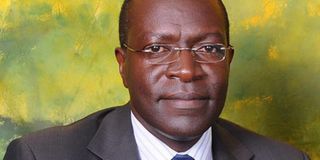240 specialist medics leave Uganda - official

Dr Medard Bitekyerezo.
Kampala. The former chairman of Health committee in the 9th Parliament, has revealed that more than 240 specialist doctors have left Uganda over the last five years due to poor pay and bad working environment.
Dr Medard Bitekyerezo, a specialist physician and former Member of Parliament, said Ugandan health workers are the worst paid in the region which has led to increased brain drain.
“A specialist of my calibre earns about Shs10m in Kenya and in Tanzania about Shs7m. This money and other allowances although not enough, enable them to go to work in other countries as opposed to Uganda where they are not paid enough to enable them sustain their families,” said Dr Bitekyerezo.
“Some key cadres are leaving the country over pay and in the last three years, specialists left Lira Regional Referral Hospital for South Sudan to earn $3,000,” he added.
He said the medics have also left due to lack of motivation in career advancement.
According to Dr Bitekyerezo, some of the specialists who have left include 11 anesthesiologists, five ENT Surgeons, 183 general practitioners, five neurosurgeons, 10 obstetricians, five ophthalmologists, two urologists, one dental surgeon and one orthopedic surgeon.
He said this during a public dialogue organised by Kigo Thinkers held in Kampala last Thursday on the topic: “State of Uganda’s Health: What the new government must do.”
Dr Bitekyerezo also noted that the Ministry of Health is grappling with other human resource challenges such as inadequate supervision to curb absenteeism, poor planning of training to ensure studies don’t affect services as well as inadequate linkage between supply and demand of human resource quality.
“Reluctance of officials at the Ministry of Health to pay intern doctors their allowances has caused corruption,” he said, adding that an intern doctor cannot survive without pay for four months.
To address these human resource challenges, Dr Bitekyerezo urged the Ministry of Health to increase supervision, accountability and quality assurance, improve payment of doctors and nurses, introduce a policy on bonding of graduate health workers and recentralise recruitment and deployment of district health officers and senior health cadres.
However, Dr Asuman Lukwago, the Ministry of Health Permanent Secretary, disagreed with Dr Bitekyerezo, saying general practitioners can move on when they find opportunities elsewhere.
“People like Bitekyerezo have never worked with government and don’t understand that public service is about offering a service to the people and not obsession with money,” said Dr Lukwago.
“When people like Dr Bitekyerezo get into positions of power such as being a Member of Parliament, they forget about public service. It might be true that some doctors have left but as government we utilise the available human resource,” he added.
The PS said many other countries such as Germany also face the problem of poor pay.




